The Big Jordan Lobby
The legacy of Michael Jordan's greatness looms large over the NBA, but it often obscures our view of greatness that happens before our eyes.
As a culture we are obsessed with heroes. Our movies are centered around them, given the main character of a film is usually called the “hero”, and in recent decades literally with the popularity of superhero movies. We are a culture that looks to entertainers and celebrities for guidance and leadership. We have even historically expected our presidents to conform to the role of the heroic leader. Every Democrat president fashions themselves in some way after Franklin Delano Roosevelt and every Republican president emulates Ronald Reagan.
One of the most culturally powerful and most pervasive heroic myth though comes from the the realm of basketball. The heroic myth of Michael Jordan. His last name Jordan is synonymous with greatness and he is routinely credited as being the greatest of all time and was a transcendent talent that was important for the marketing of the NBA and the sport of basketball at large. Jordan’s success helped build the global popularity of the league as young basketball players all around the world increasingly wanted to “be like Mike”. The legacy of Michael Jordan has become a monolith of sort. It was carefully shaped by Michael Jordan himself, most recently in the heavily curated documentary The Last Dance. It has also become an industry perpetuated by a media circuit that profited from his stardom and is now cashing in on upholding his legacy. This is something I've dubbed the “Big Jordan Lobby”.
Jordan has been made the principal archetype of greatness in the NBA. The standard to which every great player and their career is measured. The more a player’s game and mentality resembles Jordan the more they are celebrated. This of course provides endless talking points and debates that form core programming of mainstream outlets such as ESPN. It’s easy and it’s lucrative. But this way of viewing players has increasingly become counterproductive in assessing the greatness of players as the league has changed significantly in the 28 years since Jordan’s retirement. It hinders our appreciation of the abundance of unique talent we have in the NBA today.
The Myth of Michael Jordan: The Hero’s Journey
In the early days of the NBA, in the 1960s when the league was beginning to form the identity and brand that we understand the NBA to be today, two archetypes of greatness came to dominate the league.
Bill Russell was the defensive anchor and team leader of a Boston Celtics dynasty that won eleven championships. These teams were full of great players that were united together as a team by the leadership of Bill Russell. Through a dedication to the intangibles of defense and rebounding and his unwavering resolve in the face of adversity, the Celtics succeeded in large part due to Russell’s leadership. Russell was the sport’s greatest winner.
In contrast to Russell, Wilt Chamberlain represented overwhelming physical dominance. With his height and unmatched athleticism, Wilt just simply imposed his will upon anything that stood in front of him. As a result he regularly put up absurd statistics, some of which still stand to this day as untouchable. The success of Wilt’s Sixers and Lakers leveraged his overwhelming presence and gravity to build an unstoppable team.
Jordan’s success sits at the intersection of these two primal forces. He was the consummate winner that Russell was, winning six championships without losing a single time approximating Russell’s eight in a row and 11-1 overall NBA finals record. And he was also, like Wilt, a ball dominant force who imposed his will upon the game putting up ridiculous statistics in the process. On top of this, he had a insatiable, pathological drive to win at all costs, taking the burden of winning upon himself in big moments.
Jordan’s career roughly follows a familiar narrative of a hero’s journey, the narrative template identified by Joseph Campbell as one of the most fundamental to western storytelling. His call to adventure begins humbly with him being unable to make his high school basketball team. From that point on he dedicated himself to improving and his ascendance begins. Along the way he was tested at various points until he reached a near insurmountable test in defeating the Detroit Pistons. After reaching his lowest point losing to the Pistons four years in a row, in a moment of transformation he finally overcomes them en route to his first of six championships, after which he retires on top.
These are some of the elements that make up the myth of Michael Jordan. This myth has been carefully cultivated by a media intent upon banking on his marketability, Michael Jordan himself in the interest of shaping his legacy, and the post-Jordan sports media, many of which witnessed Jordan’s career, who have taken this legacy and enshrined it as the platonic ideal of winning in basketball.
The Shadow of Micheal Jordan and the Big Jordan Lobby
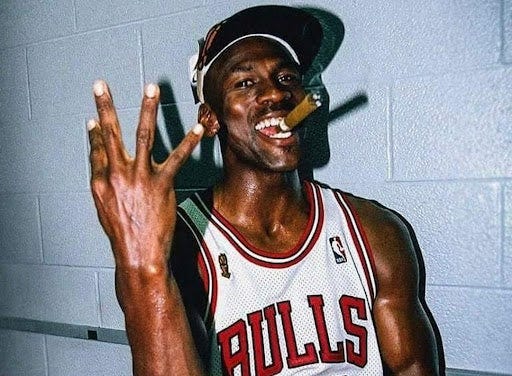
In the landscape of the modern sports discourse, the myth of Michael Jordan looms large over every superstar that has followed him. Kobe Bryant famously had to contend with the Michael Jordan comparisons throughout his career, much of which he welcomed, given he openly admitted he modeled his game after Jordan. And then there is LeBron James whose entire life has been marked by this comparison the moment he was anointed as “the chosen one” in high school.
Today the debate has split between the poles of Michael Jordan and LeBron James mostly due to the fans of both players who have an interest in promoting their favorite player as the greatest of all time. This debate is also a lucrative one as it provides for endless debate, much of which is dependent upon how you define success and greatness. And therein lies the issue.
The way we define success has become severely warped over time to the point that we expect every great player to follow the myth of Michael Jordan, a myth that was in itself uniquely great in the context of NBA basketball. If every player followed the trajectory of Jordan, winning six championships, never losing in the NBA finals, and being the ball dominant leader of the team with a killer mentality, Michael Jordan would cease being the greatest of all time and would become the original template of a mass produced design of superstar. His career might become as commonplace as Ikea furniture.
This way of defining success also obscures our view of unique talent that has come and gone in the league and the unique talent that exists in the league today. In a way this is all somewhat intentional. The sheer unattainability of Jordan’s greatness is leveraged as a battering ram by what has become the against any player that might threatened that legacy and serves as something that every superstar has to contend with whether they want to or not. This is the Big Jordan lobby that has a vested interest in preserving the legacy of Michael Jordan as the sole model in which a true superstar should follow.
The Reality of Parity of the Modern NBA
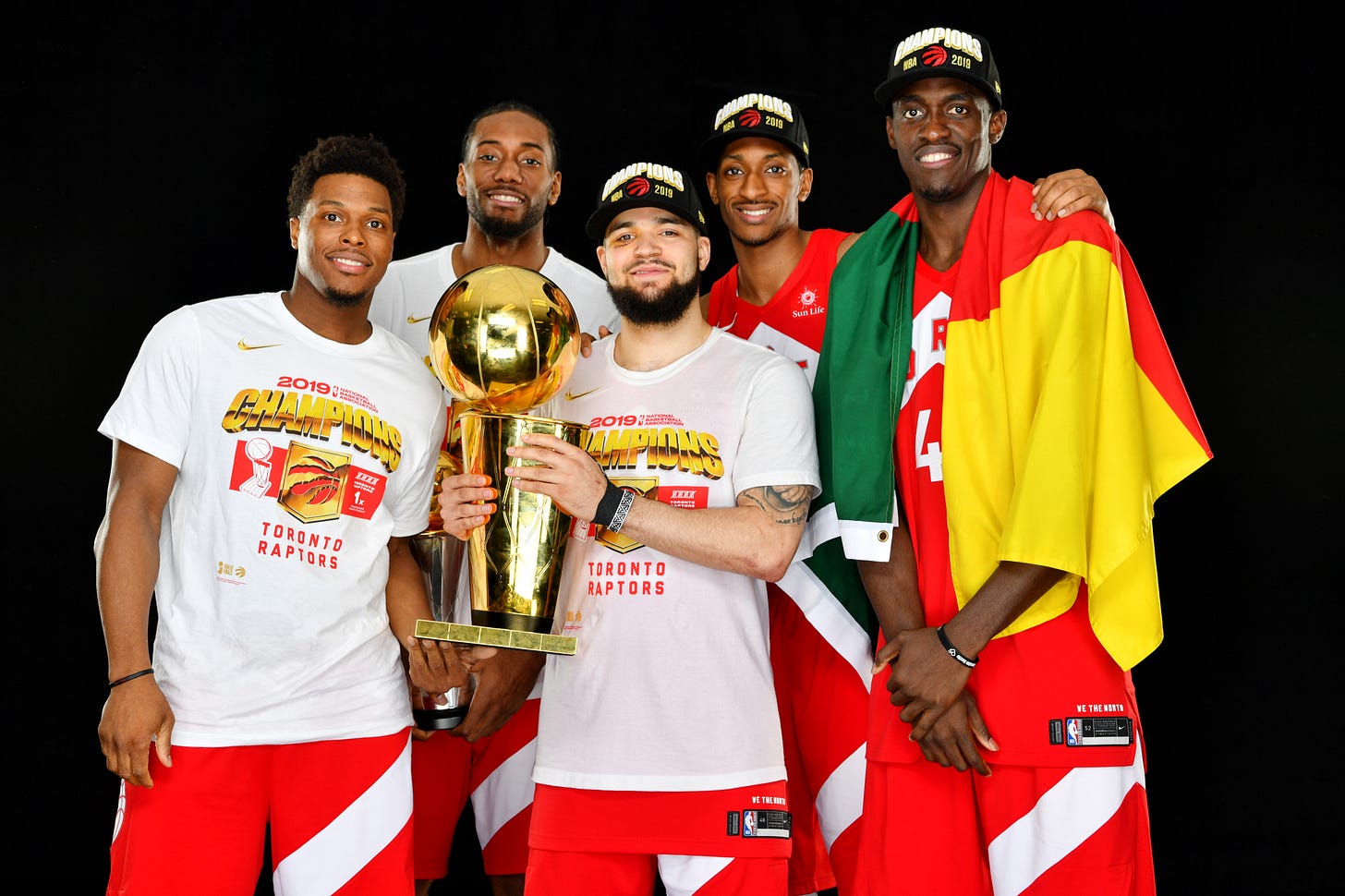
In the context of the modern NBA this way of viewing greatness has become counterproductive for appreciating the abundance of unique talent in the league today. The context of the league has changed significantly and much of these expectations hasn’t adjusted to these changes, but rather resisted them. The Jordan model at times is used as a kind of constrain to what is a great basketball career and what great basketball looks like to resist the changes in basketball that many viewers of previous eras have not enjoyed watching.
The much maligned three-point shot became an equalizer in talent as players over time have developed an ability to shoot it at a high percentage with a high volume leading to on average, role players and bench players being significantly better than they have in the past. This has completely reshaped the league. With better spacing opening up the floor significantly, offenses and defenses have been in an arms race around the reality of anyone on the floor being able to hit a three pointer. At its best modern offenses hum and sing like that of the Golden State Warriors dynasty, with constant motion and ball moment. At its worse modern offense resembles a three point shooting contest which outlier shooting can overcome all odds reducing the game to a track meet. Defenses have had to adjust to both of these realities becoming more flexible relying upon the ability to switch defenders around the perimeter and on pick and roll actions. Defenses have had to focus on split second decision making to counter the often split second decision making of an offense predicated on reacting to what the defense is presenting to them. This has given us great defenses such as that Warriors dynasty, the 2021 Milwaukee Bucks, the 2022 and 2024 Boston Celtics, and the 2024 Minnesota Timberwolves. It has developed to the point that good defense and offense look very different today than they did in previous eras. That doesn’t make them any better or any worse. When it works it works.
This change in style has also coincided with a pivotal point that occurs every decade or so, with the changing of the guard of superstars. The stars of the late 2000s and 2010s are approaching the end of their careers including that of LeBron James, whose 20 years have spanned longer than the lives of some current NBA players. This changing of the guard was symbolically apparent these playoffs with Kevin Durant, Kawhi Leonard, and LeBron James all being knocked out in the first round, and Steph Curry failing to even make the post season.
A power vacuum has opened up in the NBA, one that hasn’t been seen in decades and at this moment parity in competition is returning. With high levels of uncertainty around who will be the next transcendently dominating player, the Big Jordan Lobby has been in overdrive trying to shape the narrative and anoint a successor. Due to this parity in competition, this search has been complicated by the inability of the superstars in the league to dominate as we have expected them to.
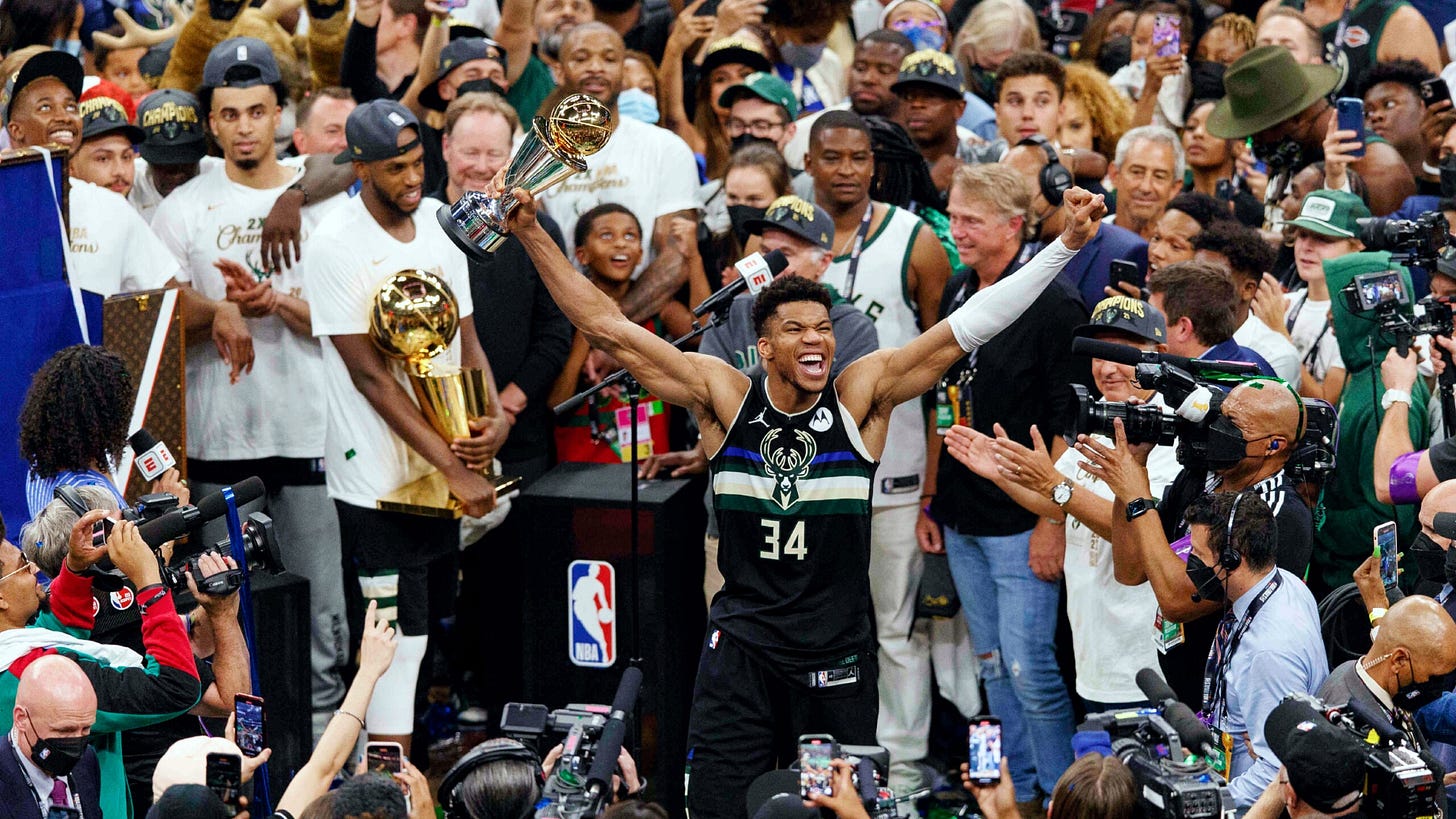
We have seen Kawhi Leonard and Giannis Antetokounmpo fall from grace with early playoff exits, Jimmy Butler usurp his position as the great pretender, Steph Curry succumb to the limitation of his teammates (especially those of Draymond Green), and most recently Nikola Jokic fail to fulfill his quest to repeat as an NBA champion in the face of his three MVPs in four years. With the advent of Jokic’s Nuggets being ousted from the playoffs at the hands of the Minnesota Timberwolves, there has been a clear trend of NBA champions being unable to defend their titles since the Golden State Warriors dynasty. In the past six seasons there have been six different champions, and nine different conference champions with only the Warriors, Heat and Celtics being able to make multiple finals runs. This is what parity looks like.
The 2024 NBA champion Boston Celtics are a team that embodies the ethos and trends of this era. If the 90s were defined by a ball dominant leader, the 2000s, by a ball dominant duo, and the 2010s by a big three, this Celtics were a team with no apparent leader, no single player dominating the box score, and every single player in the starting five having the ability to do so. The anointed star of the team Jayson Tatum is a humble individual who does not demand the spotlight (nor does he demand the ball at the end of games) and excels at the dirty work that keeps the team rolling. This is how you get an NBA finals where Jaylen Brown dominates the first two games to a level worthy of his Finals MVP, followed by a 26 point game from Jrue Holiday and a close out game with Jayson Tatum scoring 31 points. To look at this team and to say any single player is the "best” or any single player should be dominating is to miss the point of the team construction and to miss the point of this era of basketball. This era is not about stars dominating but rather a player’s ability to utilize their unique talents to fulfill the role their team needs from them in an elite way. This is why Jayson Tatum is the most fitting “star” for the Boston Celtics. Though he may not always score as much as people may like, the Celtics offense operates through him, his playmaking and his commitment to defending multiple positions and being a primary rebounder. This allows other elite players like Jaylen Brown, Kristaps Porzingis, Jrue Holiday, and Derrick White the room to be elite in what they do without worrying about picking up the slack for the team’s shortcomings.

This era of the NBA is loaded with many more unique talent with players such as Nikola Jokic, Giannis Antetokounmpo, Joel Embiid, Luka Doncic, Devin Booker, Anthony Edwards, Jaylen Brunson, Tyrese Haliburton, Shai Gilgeous-Alexander, Ja Morant, Zion Williamson, Paolo Banchero, Chet Holmgren, and Victor Wembanyama. This list goes on. It is becoming increasingly counterproductive to impose a single narrative of greatness when the very definition of it is in the process of being diversified with all these different and unique styles of players that are all competing to leave their mark on the game, many of which are still in the early stages of their careers.

The situation the NBA finds itself in reminiscent of the retirement of Bill Russell and the era of parity in the 1970s that followed. This was an era that saw the ascendence of Kareem Abdul-Jabbar overtaking Wilt Chamberlain as the best big man, and the merger adding four new teams with electrifying players such as of Dr. J and George Gervin. In this timespan 8 different teams won championships in the span of a decade with only the Knicks and Celtics winning more than once and no team being able to repeat. This era was full of great talent, many of which would go on to transform and shape how the game of basketball was played. The seeds of the fast paced electrifying free flowing 1980s were laid, as well as the hard nosed defensive teams that would also come to mark that decade. We are in the middle of witnessing such a shift yet again in basketball and we should appreciate the talent before us. Appreciate that there will never be another Jordan rather than lamenting it.



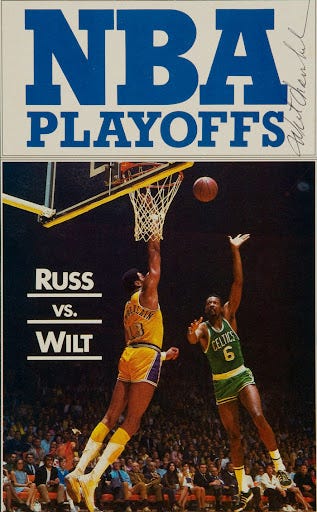
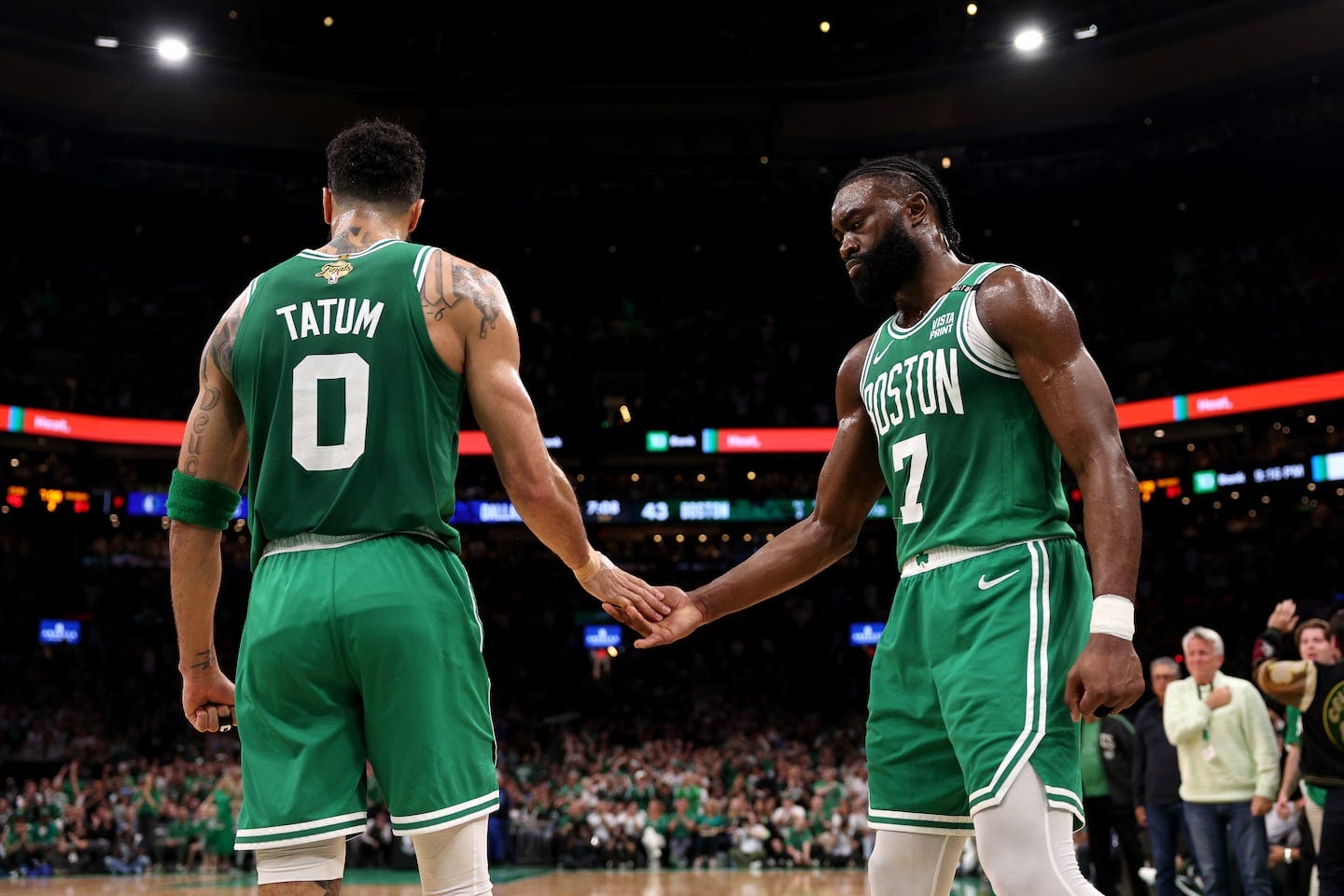
Another great one for the books, Wynton!